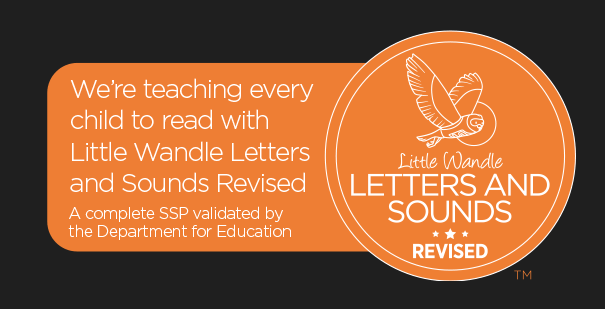Reading and Phonics at John Ray Infants

At John Ray Infant School we aim to promote a lifelong positive attitude towards reading. Reading is the key to opening the door to knowledge and it is our role to develop a love of reading from the moment the children join us. We want children to learn to read, so that they can read to learn.
At our school, we believe that all our children can become fluent readers and writers. This is why we are moving to teach reading through Little Wandle Letters and Sounds Revised, which is a systematic and synthetic phonics programme. We start teaching phonics in Nursery/Reception and follow the Little Wandle Letters and Sounds Revised progression, which ensures children build on their growing knowledge of the alphabetic code, mastering phonics to read and spell as they move through school.
As a result, all our children are able to tackle any unfamiliar words as they read. At John Ray, we also model the application of the alphabetic code through phonics in shared reading and writing, both inside and outside the phonics lesson and across the curriculum. We have a strong focus on language development for our children because we know that speaking and listening are crucial skills for reading and writing in all subjects.
Phonics in Nursery:
We provide a balance of child-led and adult-led experiences for all children that meet the curriculum expectations for ‘Communication and language’ and ‘Literacy’. These include:
o sharing high-quality stories and poems
o learning a range of nursery rhymes and action rhymes
o activities that develop focused listening and attention, including oral blending
o attention to high-quality language.
We ensure our Nursery children are well-prepared to begin learning grapheme-phoneme correspondences (GPCs) and blending in Reception.
Phonics in Reception and Year 1:
We teach phonics for 20-30 minutes a day. In Reception, we build from 10-minute lessons, with additional daily oral blending games, to the full-length lesson as quickly as possible. Each Friday, we review the week’s teaching to help children become fluent readers.
Children make a strong start in Reception: we begin teaching as soon as we can to ensure children are starting their reading journey promptly.
Interventions:
Any child who needs additional practice has daily support, taught by a fully trained adult. These sessions match the structure of class teaching, and use the same procedures, resources and mantras, but in smaller steps with more repetition, so that every child secures their learning.
We timetable daily phonics lessons for any child in Year 2 and above who is not fully fluent at reading or has not passed the Phonics screening check. These children urgently need to catch up, so the gap between themselves and their peers does not widen. We use regular assessments to identify the gaps in their phonic knowledge and teach to these at pace.
Teaching reading in Reception and Year 1: Reading practice sessions three times a week
We teach children to read through reading practice sessions three times a week. These:
o are taught by a fully trained adult to small groups of approximately six children
o use books matched to the children’s secure phonic knowledge using regular assessments of their phonic skills
o are monitored by the class teacher, who rotates and works with each group on a regular basis.
Each reading practice session has a clear focus, so that the demands of the session do not overload the children’s working memory. The reading practice sessions have been designed to focus on three key reading skills:
o Decoding (sounding out)
o prosody: teaching children to read with understanding and expression
o comprehension: teaching children to understand.
How can Parents/Carers help and support at home?
'Supporting your child at home', with the following link https://www.littlewandlelettersandsounds.org.uk/resources/for-parents/.
